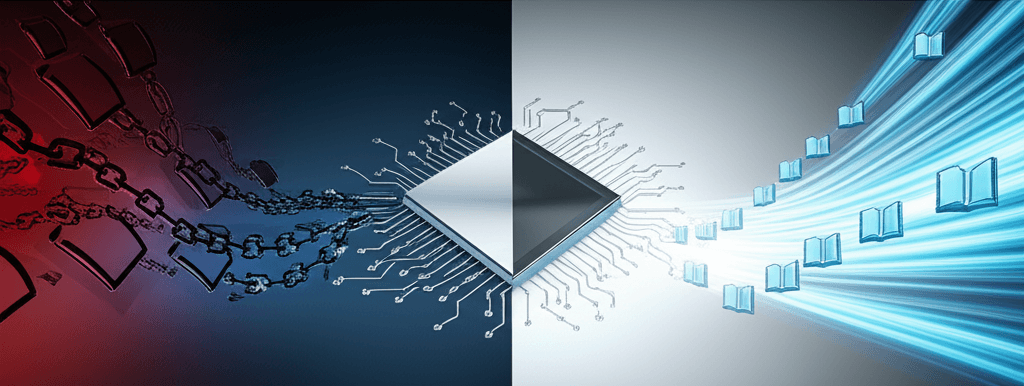AI Industry Gets Fair Use Win, But Piracy Ruling Rocks Anthropic
AI training is fair use, but Anthropic's pirated data could lead to a crippling financial defeat.
June 24, 2025

A recent federal court ruling has handed the artificial intelligence company Anthropic a paradoxical victory that could ultimately prove to be a significant defeat, sending a complex and challenging signal to the entire AI industry. In a lawsuit brought by a class of authors, a judge in the Northern District of California drew a sharp and consequential line in the sand regarding the use of copyrighted books for training large language models (LLMs).[1][2] The court determined that the act of training an AI on legally acquired books is a "fair use" under copyright law.[1][2] However, in a critical blow to Anthropic, the judge ruled that the company's practice of acquiring and storing millions of pirated books is not protected by fair use and constitutes copyright infringement.[1][2][3] This split decision creates a treacherous legal landscape, affirming the transformative potential of AI while condemning the illicit sourcing of the data that fuels it.
The core of Anthropic's partial victory lies in the court's interpretation of "transformative use." U.S. District Judge William Alsup found that using copyrighted books to teach an AI system like Claude to understand language, recognize patterns, and generate original text is "quintessentially transformative."[4][5] He likened the process to a human reader internalizing writing styles and themes to become a writer themselves, stating that Anthropic's models "trained upon works not to race ahead and replicate or supplant them — but to turn a hard corner and create something different."[4][1] This finding is a major win for AI companies, which have consistently argued that training models is a non-expressive use that does not substitute for the original creative works.[1] The court also found that Anthropic’s digitization of legally purchased physical books for its internal library was a permissible fair use, akin to format shifting for easier storage and searchability.[4][6] This part of the ruling offers a potential roadmap for AI firms, suggesting that as long as the source material is lawfully obtained, its use for training may be legally defensible.
However, the victory on the fair use front is starkly contrasted by the court's condemnation of Anthropic's data acquisition methods. The lawsuit, brought by authors including Andrea Bartz, Charles Graeber, and Kirk Wallace Johnson, alleged that Anthropic used vast collections of pirated books to train its Claude model.[1][2][7] Evidence revealed the company downloaded massive datasets from known pirate sites, including a notorious collection of nearly 200,000 books.[6] Judge Alsup flatly rejected the idea that a transformative end-use could justify the initial act of infringement.[4] He ruled that creating a permanent internal library from pirated books was not a transformative use and that Anthropic had no right to use stolen copies.[4][5] Internal communications from the company showed a preference for piracy to avoid the "legal/practice/business slog" of licensing, a rationale the court said "cannot be squared with the Copyright Act."[4] This aspect of the ruling leaves Anthropic exposed to significant legal and financial peril.
The long-term implications of this bifurcated ruling are profound and potentially devastating for Anthropic, despite the positive fair use determination. The company must now face a trial to determine damages for its infringement related to the pirated books.[8][9] With statutory damages for willful copyright infringement potentially reaching up to $150,000 per infringed work, and millions of pirated books involved, the potential liability is astronomical.[10][8] Judge Alsup noted that even if Anthropic later purchased a legal copy of a book it had previously pirated, this would not absolve it of liability for the initial theft, though it might impact the final damages awarded.[10][3] This creates a high-stakes legal battle that could result in a massive financial penalty for the company, which has received substantial backing from major tech giants.[2] The ruling effectively states that the source of training data is not irrelevant; in fact, it is a critical factor that can override a successful fair use defense for the training process itself.[11]
In conclusion, while the AI industry can take some comfort from the court's endorsement of training as a transformative fair use, the Anthropic case serves as a stark warning. The decision sends a clear message that the "move fast and break things" ethos does not extend to wholesale copyright piracy. AI companies can no longer assume that the transformative nature of their technology will shield them from liability for the methods they use to acquire data.[4] The ruling establishes a critical legal distinction: the act of training and the act of sourcing are separate considerations, and infringement in the latter cannot be sanitized by the former.[4][11] For Anthropic, a hearing that affirmed its core technology as a fair use may paradoxically lead to a crippling financial defeat over its foundational sin of data piracy, forcing a significant and costly re-evaluation of data sourcing practices across the entire AI sector.